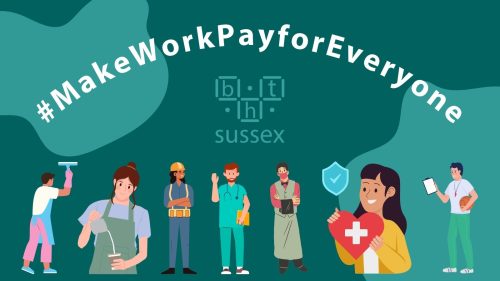Make Work Pay for Everyone
Find out about our campaign to tackle unfairness in the benefits system
What are we campaigning for?
BHT Sussex is pressing the Government to end an unfairness in the benefits system which results in homeless hostel residents being financially disadvantaged when they start working. This is a national problem affecting both individuals and the economy as a whole.
We are lobbying MPs and parliamentary groups to ask for a change in the way earnings are calculated by Housing Benefit to match how earnings are calculated by Universal Credit.
Background to the campaign
Our Accommodation for Work Project, funded by the National Lottery Community Fund, offers temporary shared accommodation and support for people who are homeless to enter or re-enter employment and training.
Over the past year 72% of people who have accessed the project have found paid work, and three quarters of them were effected by this benefits anomaly, ending up worse off when they increased their working hours, simply because they were living in a homeless hostel. Those effected were working in all sorts of different roles, including as support workers, dental nurses, baristas, chefs, electricians and construction workers.
The Accommodation for Work Project has worked closely with Brighton and Hove Housing Benefit department to use Discretionary Housing Payments to prevent project residents from being financially worse off when they are working. However, as this is only a discretionary payment, this innovative work at the local level is not a solution to this national problem.
We are asking for a change in the benefits system to #MakeWorkPayForEveryone. You can read more about the launch of the campaign here.
Real Life Stories - how have our clients been affected?
At the Accommodation for Work project last year, 75% of working residents were negatively effected by this benefits anomaly, with residents under 25 being impacted once their monthly earnings passed the £482 threshold and residents over 25 being impacted once their monthly earnings passed the £608 threshold.
Dave
Dave, 23, became homeless due to family breakdown; he was asked to leave the family home and found himself unemployed and with nowhere to live.

Had he not been homeless and not living in a hostel Dave would have received this help towards his rent. This situation continued for more than six months, meaning Dave was over £700 worse off than someone working and living in private rented accommodation.
Mo
Mo, 45, had a long history of sleeping rough in Brighton and Hove as an asylum seeker. Once he had secured the right to work, he was determined to find a job. Before coming to us, Mo was in another temporary hostel in the city; however, they would not support him working.

The following month Mo earned £610; however, because of how housing benefit calculate earnings, although he had earned £10 more, he was worse off by £160.45 because he had to pay this much more towards his rent. Had he been living in private rented accommodation Mo would have received this help towards his rent, but because he was living in a homeless hostel, he was worse off in work.
Latest campaign updates
We have written to all Sussex MPs outlining our campaign and asking for cross party support on this issue. As a result, MPs from across the political spectrum have raised our concerns at various levels of government, for example with Parliamentary Questions and letters to the Department for Work and Pensions (DWP).
Following correspondence between ourselves, supportive MPs and the DWP, we were invited to meet with representatives from the DWP to discuss the campaign further and submit evidence about the effects of this benefits anomaly on our clients. Going forward we are meeting regularly to support the DWP in finding a workable solution to the problem.
We have reached out to other organisations to work with us on this campaign and have been featured for example in a blog for Homeless Link. We have been in discussions with the youth homelessness charity Centrepoint, who have published a very useful policy briefing with specific recommendations for how to bring Housing Benefit rules in line with Universal Credit, and we have expanded their recommendations to cover those over 25.
Our Accommodation for Work project has developed an online calculator to provide a simple tool for hostel residents to see how work impacts on their benefits and rent. We hope to achieve a change in the benefits system through this campaign, but this calculator helps people navigate the system in the meantime.
Frequently Asked Questions
Campaign Q&A
Hostel residents are required to claim Housing Benefit rather than Universal Credit (UC), which private tenants would claim for their rent. Housing Benefit treats income differently than UC, resulting in hostel residents having to pay more in rent than if they were claiming UC.
Many homeless people want to work and are able to work. In the past year, 72% of residents at the BHT Sussex Accommodation for Work project were working.
Many people view work as an important part of moving their lives forward. We find that people really want to work and many do work when living in a homeless hostel. Some may have had to overcome multiple barriers. However, everyone who lives in a hostel will experience more difficulty with returning to work because of the unfairness in the way their earnings are calculated.
Q&A for people who are living in hostels
No, any earnings will reduce the amount of benefit you’re entitled to regardless of how many hours worked. The only exceptions are Employment Support Allowance claimants doing Permitted Work or Universal Credit claimants with Limited Capability for Work.
If a hostel resident gets any Universal Credit personal element, then they are passported to getting full Housing Benefit. Over 25 year-olds can earn up to £670.42* per month before their Housing Benefit is affected. Once they earn £670.43* or more, the earnings hit a cliff edge and the amount they have to pay towards their rent increases sharply. By earning 1p more, they can be substantially worse off. This is due to the way Housing Benefit calculates earnings. If Housing Benefit calculated earnings in the same way as Universal Credit, there would no longer be a cliff edge.
*Figures based on April 2023 benefit rates
Under 25-year-olds are entitled to less benefit than over 25-year-olds, so if they earn up to £531.09* their full Housing Benefit will be paid. However, if they earn 1p more, they will have to pay substantially more towards their rent.
*Figures based on benefit rates April 2023


